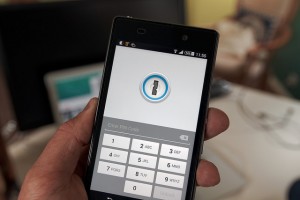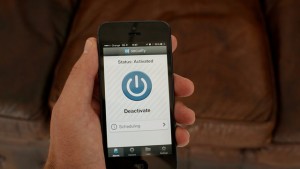 We use our smartphones and other mobile devices for many functions in our daily lives. It’s almost impossible to go through an entire day without seeing someone tapping, scrolling, or swiping through their phone, never mind using your own phone. We’ve created a mobile environment where convenience lies in the palm of our hands.
We use our smartphones and other mobile devices for many functions in our daily lives. It’s almost impossible to go through an entire day without seeing someone tapping, scrolling, or swiping through their phone, never mind using your own phone. We’ve created a mobile environment where convenience lies in the palm of our hands.
Technological progression has taken us so far in a short amount of time; we can pay our bills on our phones, we can chat with someone a world away, we can make everyday purchases, and now they can be used as an extension of our security systems. In particular as a means of access control and authentication in commercial applications using near field communication (NFC). According to Jeremy Earles, Readers and Credentials Portfolio Manager for Allegion, NFC technology, “provides simplified transactions, data exchange and wireless connections between two devices that are in close proximity to each other…” This is essentially the same technology you may have seen advertised by Samsung where two phones can be tapped together to share information, see HERE.
At Perfect Connections, Inc. our team of licensed professionals provide comprehensive security system solutions to businesses throughout northern and central New Jersey. We have been helping a wide range of businesses secure their facilities for over 25 years. As with any technology, progression in the realm of security components shows no signs of slowing. At Perfect Connections we realize it is our responsibility to stay on top of these changes and provide our clients with solutions that are current but practical as well.
NFC technology is an exciting new venture in access control applications. However, it has yet to become as ubiquitous as traditional access controls like key fobs, swipe cards, and proximity readers. One of the many reasons being NFC technology has yet to become an innate feature in the spectrum of devices in circulation today.
In theory NFC access control would work by allowing your employees and authorized users to utilize their mobile device, likely their cellphone, as their access credential. The user’s phone would have an embedded NFC chip that would wirelessly receive an authorized credential from an administrative control. This process can be similar to how you would download an app or retrieve information stored in a cloud service; or it could be easily managed by plugging the phone into an administrative device via a USB cord. Once the phone has the proper credential it can be used in the same fashion as a fob or proximity card, simply tap the phone or be within range of a reader that will grant or deny access. Imagine the convenience!
With 5.9 billion, or 87% of the world’s population, being mobile subscribers it’s no wonder NFC technology is creating buzz among end users and security integrators alike. Of those mobile subscribers 91% keep their phone within and arm’s length throughout the day and night. It only makes sense that phones would become part of integrated security protocols. With younger generations the desire for new and streamlined processes is endless, especially for those now entering the workforce. They don’t want to be bothered with having to search through their pockets or purses for badges or fobs when their phone like an extension of their hand. While NFC technology may not be the universal method for access control yet, the case for it exists today.
One of the many benefits NFC technology offers is no longer having to print or buy new ID badges which can be costly and time consuming. It also allows you to change credentials on and as needed basis. This would be helpful if you have a contract or temp worker who needs provisional access. You would simply send or upload a temporary credential to their phone and when their job is done you can delete access from the administrative network.
According to Ron Oetjen, president of Intelligent Access Systems (IAS), NFC technology saves money by not having to replace lost or stolen card credentials. Oetjen argues that security may be even better when using smartphones than cards or fobs considering how obsessively people guard them, and the fact that in order to use it as a credential the phone first has to be unlocked using a PIN or biometric identification. So many companies already employ a BYOD (bring your own device) policy at work that the transition would be easy for the user. If a phone is lost or stolen it can be remotely tracked, disabled, and/or wiped preventing an unauthorized user from gaining access.
Like any other developing technology, NFC is not perfect and consumer perception is still evolving. Currently one of the major drawbacks is that it’s not universally integrated in mobile phones and access readers. Then there are some businesses that don’t want to lose the traditional ID badge that displays a photo of the user for security reasons. The issue of existing security infrastructure can be tricky too as it may require the removal and reinstallation of new system components which adds cost.
The world of security systems is constantly evolving. This requires integrators and end users to be aware of changes that will affect and potentially enhance their systems. NFC technology is an exciting addition to the access control component of a security system that will likely become more ubiquitous in the coming years. It will provide a new level of security and convenience that has yet to be fully realized. At Perfect Connections, Inc. our licensed integrators are constantly educating themselves on changes in the industry and how they may benefit our clients. We provide comprehensive security systems that include access controls to businesses and facilities throughout northern and central New Jersey, and have been doing so since 1992. Our experts will help guide you through the process from an initial security assessment to final installation, implementing technologies that are not only effective but make sense for your specific situation.
If you live or run a business in Central or Northern New Jersey and would like information on any of the topics discussed above, please call 800-369-3962 or simply CLICK HERE.
Image Credit: Image by Ervins Strauhmanis-Flickr-Creative Commons

 Fire is an unpredictable force that can wreak havoc on any business. It is imperative as a business owner, facility manager, or building owner that the proper precautions are in place to help prevent catastrophe. The
Fire is an unpredictable force that can wreak havoc on any business. It is imperative as a business owner, facility manager, or building owner that the proper precautions are in place to help prevent catastrophe. The 
